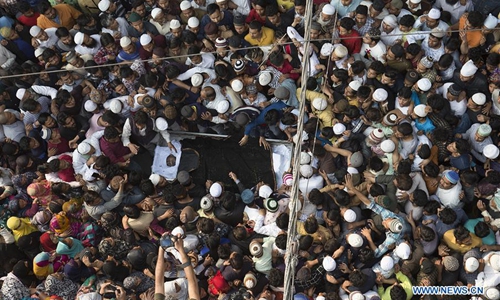India could face a lurking COVID-19 outbreak
By Liu Caiyu in Beijing and Hu Bofeng in New Delhi Source:Global Times Published: 2020/3/10 0:23:40

People in New Delhi, India. Photo: Xinhua
The battle against the coronavirus infection in India, the world's second most populous country, may just be beginning as thousands haven't been tested due to insufficient and cumbersome nucleic acid test criteria.
The number of coronavirus cases in India was just six as of March 3, but has since risen to 43, including 16 Italians, Indian media NDTV reported Monday. No deaths have been reported as of press time.
The load of screening samples from suspected cases in India is limited as previously only a few national laboratories were authorized to conduct nucleic acid tests, which must be done at least twice before a confirmed case is reported and the testing duration is usually pretty long, an India-based observers told the Global Times on Monday.
At least 1,000 highly suspected cases in the country are waiting to get rechecks, a source close to the matter told the Global Times.
The nucleic acid test won't be available to all as tests were only given to people identified as "suspect cases" which must conform to a certain criterion, and only when samples are tested positive twice shall the case be categorized as a confirmed case, India's health ministry said.
Only a few government designated places are able to confirm the tests. The National Institute of Virology based in Pune, one of them, only tests an average of 25 samples a day. But in China's Wuhan, a modernized lab with automation equipment can test 10,000 samples a day, according to chinanews.com.
In the wake of the continuous increase of confirmed cases, Indian authorities only started to enhance its capacity for the detection of the disease over the weekend by authorizing 52 laboratories nationwide to conduct testing samples and 57 labs to collect samples, media reported.
The cumbersome testing criteria and long testing duration could mean a lot more people who might be infected with the COVID-19 are out there. If an epidemic happens in India, it could be a nightmare for the world, observers noted.
"I hope the government could find a more efficient way to provide test results in a shorter time," retired epidemiology doctor Ram, who lives in New Delhi, told Global Times. "It would help the public health department take appropriate steps."
"India is trying to make up for its deficiency by allowing more institutes to do sample tests but it may still be challenged by the shortage of supply test kits," Xie Chao, an assistant professor on Indian studies at Tsinghua University, told the Global Times on Monday. "The outbreak in India seems inevitable," Xie said.
The Indian health ministry said earlier that up to 25,000 testing kits have been made available, which Xie said "is too optimistic."
If the epidemic spreads, this number of test kits is far from enough. Screening suspected and confirmed cases is a prerequisite for reducing the spread of the disease, Xie noted.
India shall continue to expand its testing scale and offer adequate hospitalized wards in the face of the increasing number of confirmed cases. But analysts noted it is impossible for India, which has a weak health system, to set up such numbers of nationwide quarantined wards like China, as the health system capacity between states in India varies.
This is certainly the start of the India chapter of the coronavirus pandemic, writes News Laundry, a digital media based in India. But Harsh Vardhan, Health Minister of India, assured Monday that the situation in Delhi is no longer "alarming."
Hundreds of Indians recently visited hospitals for tests in New Delhi for fear of being infected. A photo on Friday showed Indian people lining up in front of a screening center in the city to get themselves tested, India Today reported.
Indian nationals reached by the Global Times either from New Delhi or the southern city Chennai said that despite the widening epidemic, most people don't wear masks, a necessary protective gear to prevent transmission.
Zhao Yusha contributed to the story
Posted in: DIPLOMACY,ASIA-PACIFIC